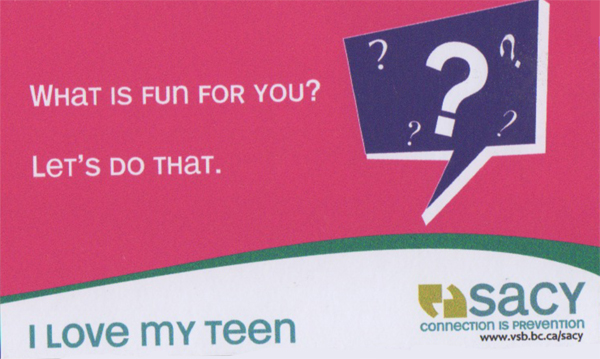 Are you looking for ways to stay connected and strengthen your relationship with a teen[1]? One tactic is to try and find things you both like to do. Sometimes, however, it can seem like there isn’t anything you both are interested in!
Are you looking for ways to stay connected and strengthen your relationship with a teen[1]? One tactic is to try and find things you both like to do. Sometimes, however, it can seem like there isn’t anything you both are interested in!
Here’s a tip: There are times parents might have to “fake it” or at least endure a less than appealing activity. Be open and willing to connect over something that isn’t your favorite thing to do. For example:
-
You may not like hockey, but are you willing to sit through a game, provide some snacks, and ask your teen to teach you something about the game?
-
Would you consider joining them on the couch to watch a horror film or their favourite comedy show?
-
Could they teach you a skill such as setting up an instagram account or learning how to play the guitar?
-
How about a shopping trip to their favourite stores?
-
Can you let them drive you places and even suggest heading out on the highway?
While the specific activity might not be your choice of entertainment, keep in mind the bigger picture. When parents share in something an adolescent likes, they get to know them better, and the relationship becomes more relaxed. The teenager feels their interests (and they) are respected. You never know, you also might enjoy the activity! If not, the increased connection that you build is worth it.
Sometimes, if your relationship has gotten particularly tense, you might be reluctant to engage in something fun together because it feels like condoning other behavior. But enjoying your teens company doesn’t mean you agree with behaviours you have already dealt with (probably quite thoroughly). If you have “grounded” your teen for the weekend—why not use it as a chance to “ground them in family?” As long as they are not going out with friends, why not have some fun together - take the family bowling, have a home movie marathon, go to a concert, or plan a big meal to cook together?
Also see:
Parents… Remember to Listen and Breathe
The teen years are full of physical, social, emotional and cognitive changes making it a potentially challenging period for parenting.
A literature review on the topic of the parent– adolescent relationship highlights that opportunities to interact promote understanding, improve the relationship and positively affect the adolescent emotional well-being.
Adolescents lacking communication, positive relationships relationships, and closeness with their parents are reported to struggle with the transitions of the teen years. They have more academic difficulties, are likely to develop depression, and are challenged with how they approach moral dilemmas.
Visit the SACY site for more information and inspiration to build connections between parents and youth.